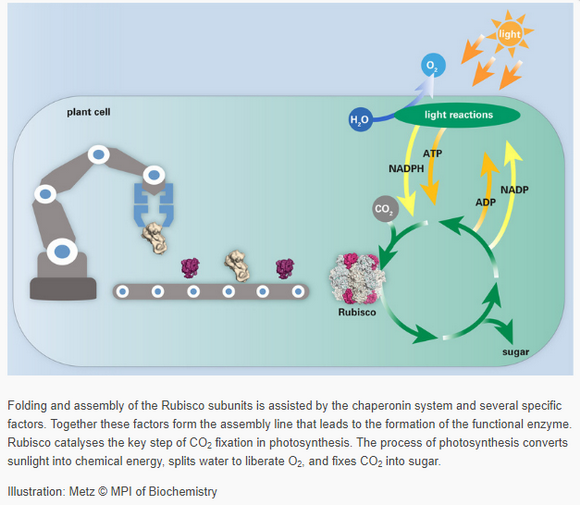
Max Planck Researchers Engineer Key Enzyme in Photosynthesis
December 13, 2017| |
Researchers at the Max Planck Institute of Biochemistry have succeeded in producing functional plant Rubisco in a bacterium, allowing genetic engineering of the enzyme. Rubisco, a critical enzyme in photosynthesis, catalyzes the first step in carbohydrate production in plants, the fixation of CO2 from the atmosphere.
The researchers, led by Dr. Manajit Hayer-Hartl, generated functional plant Rubisco in a bacterial host by simultaneously expressing plant chaperones and Rubisco in the same cells. This enabled the scientists to understand the complex assembly pathway of Rubisco, and also modify the Rubisco gene to improve its properties. Once they have obtained a Rubisco variant with a desired trait, they can insert the modified gene back into the plant cells, a key-step towards improving photosynthesis through Rubisco engineering.
"The bacterial expression system resembles an assembly line for cars. Whereas previously, every optimized variant of Rubisco had to be painstakingly expressed in a transgenic plant, which takes a year or more to generate - like building a car by hand - we can now make hundreds or thousands of Rubisco variants in days or weeks. It is like building cars in an automated assembly line," explains Dr. Hayer-Hartl.
For more details, read the Max Planck Institute of Biochemistry news release.
| |
Biotech Updates is a weekly newsletter of ISAAA, a not-for-profit organization. It is distributed for free to over 22,000 subscribers worldwide to inform them about the key developments in biosciences, especially in biotechnology. Your support will help us in our mission to feed the world with knowledge. You can help by donating as little as $10.
-
See more articles:
-
News from Around the World
- FAO Calls for Urgent Actions to Reverse the Rise in Hunger
- Global Impact of Not Planting Herbicide Tolerant Crops Due to Glyphosate Ban
- Study Identifies Genetic Basis of Western Corn Rootworm Resistance
- New Technique to Help Plant Breeders Develop Drought Resistant Varieties Faster
- Australian OGTR Invites Comments for Field Trial of GM Perennial Ryegrass
- Max Planck Researchers Engineer Key Enzyme in Photosynthesis
-
Research Highlights
- DND1-Silencing in Potato and Tomato Confers Resistance to Botrytis cinerea
- ThPP1 Gene Enhances Alkali Stress Tolerance in Transgenic Rice
- Arabidopsis' AtGOLS1 Gene Negatively Regulates Seed Germination
-
Beyond Crop Biotech
- Salk Scientists Use Modified CRISPR System to Treat Diseases
-
Resources
- Sugarcane in Africa
- Biotech Crop and Traits Annual Updates
- ISAAA Blog: Clive James and ISAAA, Top Sources of Info on Biotech in the Philippines
-
Plant
- Indian Researchers Test CRISPR-Cas9 Genome Editing in Banana
- Lignin Reduction Observed in CRISPR-Edited Switchgrass
-
Read the latest: - Biotech Updates (April 17, 2024)
- Gene Editing Supplement (April 10, 2024)
- Gene Drive Supplement (February 22, 2023)
-
Subscribe to BU: - Share
- Tweet

